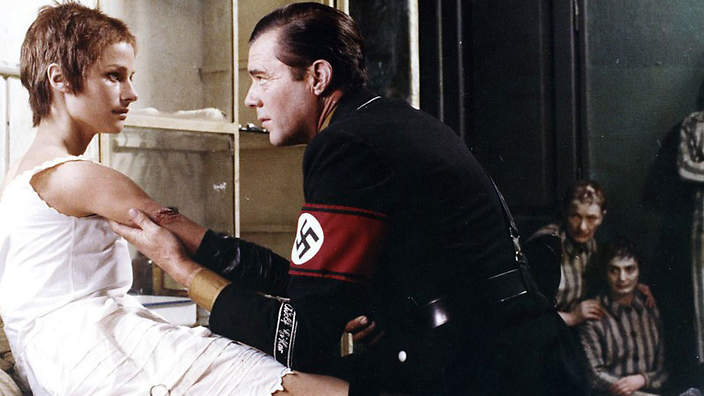
The Night Porter, 1974, dir. Liliana Cavini IMDB, Wikipedia
If there’s an image that epitomizes 1970s kink, it’s Charlotte Rampling in the Nazi-exploitation classic The Night Porter: topless, wearing an SS officer’s cap, trousers, boots and suspenders, singing something in German to soldiers. It’s an iconic image, perhaps echoing Marlene Dietrich’s equally memorable turns in male and military drag. It’s also rather disturbing, suggesting a kind of fascist chic that no doubt had people making crude theories about the link between deviant sexuality (i.e. fetishism) and deviant politics (i.e. fascism).
Chronologically, the movie starts with Lucia as a young girl of ambiguous age in the pre-war era, before she and her family are picked up and imprisoned. Max, an SS officer, picks her out of a lineup of nude concentration camp prisoners, for his favorite. It’s implied that Lucia went through her sexual awakening and maturation from girl to woman in a concentration camp, under Max’s tutelage.
Her ideals were men who had the power of life and death over her, and her only agency was through pleasing and even mimicking them, becoming a kind of mascot figure. The iconic sequence ends with Max presenting Lucia with the head of a male prisoner who was tormenting the female prisoners. It’s a clear Salome reference, foreshadowing that Max’s love, or at least desire, for Lucia will be his downfall.

Years after the war, Max lives quietly as a night porter in a luxury hotel, serving as servant, pimp, drug pusher, audience and more for the people who live and work there. He meets with a group of other former Nazis who conduct “research”, with the real purpose of concealing the evidence of their war crimes, and stage “trials”, where they exonerate each other. Lucia, now an adult, arrives at Max’s hotel and disrupts his cozy setup, threatening to reveal his secret but also to destabilize his detachment. Max’s retired Nazi buddies may kill her to conceal his secrets, or he may have to do it himself. Lucia herself is torn between hate and love, revenge and mercy.
In The Night Porter, all relationships are ambiguous and reversible. Max is both servant and master of his guests. Lucia both threatens to reveal Max’s criminal past and awakens feelings of love. When Max and Lucia finally meet face to face postwar, they go through a cascade of different emotions in a single shot: fear, hate, rage, guilt, shame, lust and even love.
Eventually, Max and Lucia barricade themselves in Max’s apartment, where they begin starving, too afraid they will be killed by one party or another if they go outside, even for food. They fall into their old patterns from the concentration camp: Max as protector/jailer, Lucia as prisoner/object of desire. This suggests that they are alone together in a hostile world.
As previous works I’ve discussed here have shown, there’s a complex relationship between real life violence and exploitation and theatrical enactment of the same. Lucia wears the SS gear as a kind of protective camouflage, or perhaps identifying with the aggressor. And yet, Max’s influence probably did save her life. We also have to wonder how much of the flashback scenes are filtered through a scrim of fantasy, though they were of events and settings that were already like dreams or nightmares.
Anne Desclos, alias Pauline Reage, author of Story of O, more or less acknowledges that the threat of German military aggression, ambient to a young girl during the first World War, influenced her sexual fantasies. In the interview cited previously, she was quite matter-of-fact about this, but doesn’t regard this as a sickness or a problem. The impression one gets is that the woman who wrote the classic of female masochism and even self-destruction led a real life that was reasonably liberated, if not more so, and wasn’t at all angst-ridden about her fantasies or her notorious book. This is unlike Sacher-Masoch or TE Lawrence, who were highly conflicted about, and consumed by, their kinks. Perhaps the issue is not the content of the fantasy but our relationship to them, where they fall on the continuum from idle daydream to pathological obsession. Who do we really help by contorting ourselves into paroxysms of guilt or rationalization because we find Lucia’s Nazi drag sexy?
Addendum: According to a German friend, Lucia’s song “Wenn ich mir was wünschen dürfte” is an old Marlene Dietrich song, and the lyrics translate to something like:
If I were to wish for something,
What I should wish then,
a bad, or a good time?
If I were to wish for something,
I would like to be just a little happy
because if I were too happy
I would long for suffering…



